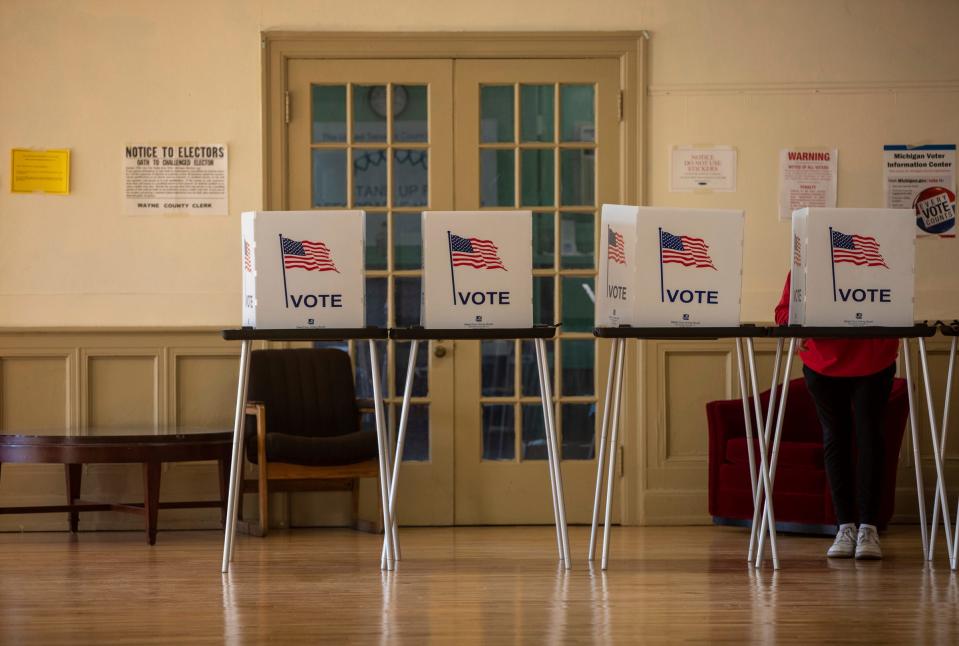Michigan lawmakers move to enact voter-approved election changes
Michigan lawmakers kicked off hearings Wednesday on legislation to update election laws to reflect changes approved by voters who passed a major expansion of voting rights in the state last November.
Sixty percent of Michigan voters who participated in the 2022 midterm election approved Proposal 2 the "Promote the Vote" amendment to the state constitution.
Among the most significant changes, the amendment requires election officials to offer at least nine days of early in-person voting during statewide and federal elections. Before the amendment's adoption, Michigan voters could cast an absentee ballot in person leading up to Election Day. But now they will be able to cast an in-person ballot just as they would at their polling location, placing it into the tabulator themselves.

The amendment also codifies current voter ID rules, allows voters to receive absentee ballots for all future elections with a single request, requires drop boxes and prepaid postage for absentee voting in every municipality and allows ballots cast by military and overseas voters to count even if election officials receive them after Election Day.
More: Whitmer signs bills banning distracted driving on Michigan roads
More: Michigan Chief Growth Officer Hilary Doe is 1st official in charge of boosting population
State Sen. Jeremy Moss, D-Southfield, who chairs the state Senate's Elections and Ethics Committee, celebrated the passage of the amendment at a time when the state's election system came under intense scrutiny, saying it showed voting rights remain popular among Michigan voters.
"We are writing a historic new chapter for voting in the state of Michigan," he said. "Today, we introduce the implementation of a new method to connect voters to their ballot box."
Democratic Secretary of State Jocelyn Benson said the passage of Proposal 2 showed bipartisan support to create more opportunities for Michigan voters to have their voices heard and called on lawmakers to quickly pass bills enacting the changes to give clerks enough time to start preparing for the presidential primary next year.
"These bills will implement the will of the voters which I think spoke loud and clear last fall in a way that was both overwhelming and inspiring," Benson
Benson's Republican predecessor state Sen. Ruth Johnson, R-Holly, who served as secretary of state from 2011 to 2018, cast doubt on support for the changes made by Proposal 2. Johnson accused backers of the amendment of running ads that misinformed voters, and alleged that voters passed the election changes "based on lies and deceptions."
At one point during the hearing, Johnson questioned whether sufficient safeguards would be put in place to prevent Michigan voters from voting more than once. Saginaw County Clerk Vanessa Guerra representing the Michigan Association of County Clerks pointed to checks and balances in the election system to prosecute those who break the law. But a perfect election system capable of rooting out all fraud is unattainable, she said.
"I think that if the thought is that we’re going to have a system that entirely prohibits any type of fraud that that would be impossible. But if we create systems that are so prohibitive that they actually make it harder for voters to vote, I think that would be un-American, right?" she said.
In the 2020 election, hundreds of audits, court rulings and post-election investigations uncovered no evidence of widespread fraud.
Democratic Gov. Gretchen Whitmer has already approved one update to Michigan election law to reflect the changes made by voters last fall. She signed into law Senate Bill 259, which requires election officials to count military and overseas ballots received within 6 days of an election.
Other bills recently introduced in the state House and Senate would establish early voting procedures, new drop box requirements and other components of Proposal 2. The House Elections Committee is scheduled to hold a hearing on the bills Thursday. The Secretary of State's office estimates that it will take just over $63.8 million in one-time costs and just over $21.1 million in annual costs to implement the changes in Proposal 2.
The 2024 presidential election cycle will mark the second consecutive one in Michigan that sees major changes to the state’s voting process. The 2020 cycle saw the first statewide elections in which every voter had a right to cast an absentee ballot.
Contact Clara Hendrickson at chendrickson@freepress.com or 313-296-5743. Follow her on Twitter @clarajanehen.
This article originally appeared on Detroit Free Press: Michigan election law updates planned ahead of 2024 cycle

